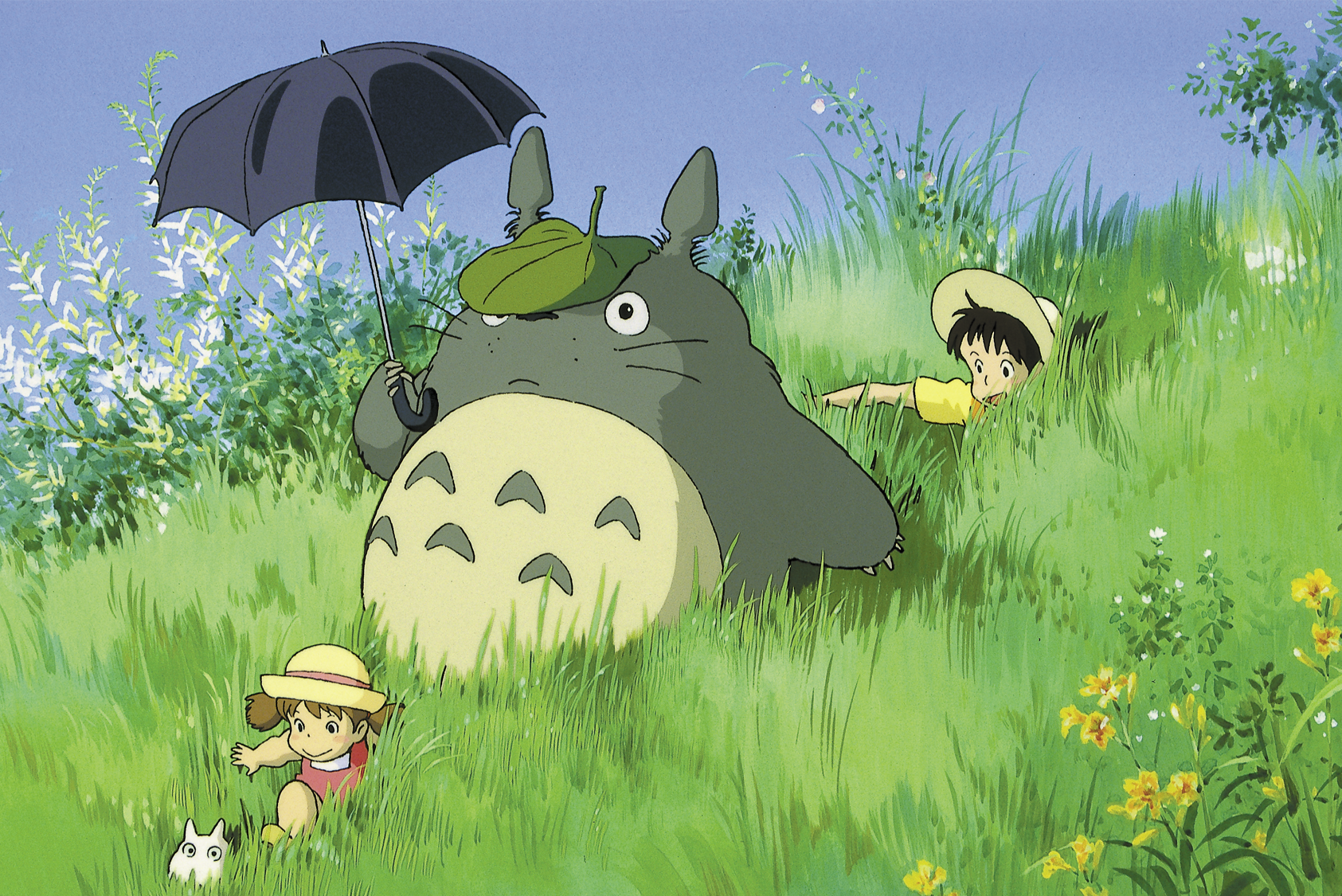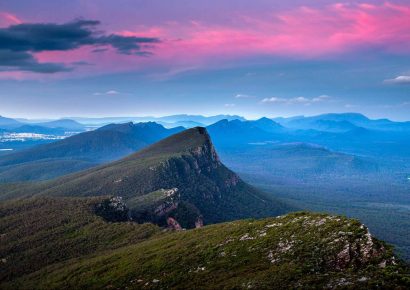We rank every film to find the best Studio Ghibli movies of all time.
In light of ACMI’s month-long Studio Ghibli celebration that kicks off this week, we’ve taken a look through the inimitable animation house’s entire output of feature films to get you keen – many of which will be screened throughout ACMI’s showcase.
It’s exceptionally difficult to summarise the magic and wonder of Studio Ghibli – the Japanese animation studio whose films, shows and games have introduced young minds to worlds of limitless imagination. A creator of beloved worlds with an exceptional track record, eight of Studio Ghibli’s films are among the 15 highest-grossing anime films ever made in Japan, they’ve been nominated for five Academy Awards and won four Japan Academy Prizes for Animation of the Year.
How do you even begin to compare the best with the best? It wasn’t easy, but we’ve done the hard yards for you. What would have been your favourite picks?
HONOURABLE MENTION: Nausicaä of the Valley of the Wind
While technically not a Ghibli film, Nausicaä is often considered a necessary predecessor for lovers of the studio, containing many of the creative forces who would go on to found the company but a year later. A sci-fi fantasy epic dripping with the same incredible creativity and gripping adventure, the film is vital homework for seasoned fans. Essential.
20. Tales from Earthsea
Tales from Earthsea holds a twisted honour amongst anime enthusiasts, often copping it as the worst of the respected studio’s offerings (the Cars 2 to Ghibli’s Pixar, if you will). A weak interpretation of Ursula K. Le Guin’s beloved fantasy series, the admittedly-pale debut from studio co-founder Hayao Miyazaki’s son Gorō still has decent animation and intent when placed amongst the greater media landscape – just not enough on hailed home soil.
19. My Neighbors the Yamadas
A film that trades Ghibli’s usual fare of complex animation for cruder, comic-style sketches, The Yamadas still pack a lot of heart. A cute lil’ number about families being families, the film presents a series of vignettes about family roles in the perpetually-tumultuous social evolution of modern Japan. Disjointed in technique, but not without merit – it’s surprisingly touching.
18. From Up on Poppy Hill
A more studious and nuanced attempt by Gorō Miyazaki, this slice-of-life drama about a group of teenagers trying to save their old clubhouse from getting torn down for the 1964 Olympics is a fairly nice period piece, if not a little bland. The classic factors of historical celebration and wholesome activity are there, and they work pretty well. Perfectly pleasant.
17. The Cat Returns
A young girl with an ability to talk to cats gets taken to a magical realm where she accidentally becomes engaged to a cat prince. It’s a strange way to set the scene for a parable on confidence, but there’s a distinct madcap charm. In many departments, it’s not as strong as its loose predecessor, Whisper Of The Heart (which you’ll hear more about later) – but it’s fun.
16. Arrietty
Sweet (if not inoffensive), this loose interpretation of Mary Norton’s The Borrowers has earnest imagination and a host of likable characters. A curious boy discovers a family of tiny people secretly living in the walls of his great aunt’s house, paving the way for a world of creative designs and lush orchestral fare. Easy-going, innocent fun for young-uns.
15. Howl’s Moving Castle
Showcasing Ghibli’s patented blend of European design, Japanese spirituality, and turn-of-the-century technology, this popular go-to is a visual feast full of high-octane adventure, magical mirth and a goddamn walking steampunk castle. When you turn everything Ghibli’s about up to 11, the pacing suffers and subtlety is shot to pieces – but when you’re having such a great time, you won’t care.
14. The Wind Rises
The tale of a brilliant mind who sees his creations overtaken by destructive minds, Poppy Hill is itself bittersweet. Problematic thematically – if not great cinema on its own terms – the film is a highly fictionalised account of Dr. Jiro Horikoshi, chief engineer of Japan’s fighter planes during World War II. You wish more of it was real, because the fantasy – the celebration, the tragedy and the emotional impact – wield such a powerful statement.
13. Kiki’s Delivery Service
Short, light and fizzy, the adored tale of a young witch moving out of home and starting a flying broomstick delivery service is both an adorable and accurate nod to everybody’s first shaky steps into adulthood. Nobody teaches you how to do it properly and noone can prepare you – you’ve just got to give it a go. Bonus points if you’ve got a talking cat, though.
12. Pom Poko
The most deeply-underrated of the Studio Ghibli family is an environmental parable about argumentative Japanese raccoon dogs with magic testicles. There, I finally said it. Pom Poko has a lopsided tonality, and it gets a little preachy – but within an anarchic display of playful mischief, it packs some truly profound truths and heavy realities on how we treat the land the walk on.
11. Ponyo
Ponyo is bloody adorable. Probably the closest Hayao Miyazaki got to the sugar-powered Western world classics of Disney (such as Aladdin or The Little Mermaid), it’s pretty simple, but hyperactive and visually stunning. A magic fish befriends a boy and longs to become a human girl in a tale of innocent wonder and curiosity – what’s not to love?
10. When Marnie Was There
A ghost story about personal discovery and taking on the elusive, shadow-like nature of your personal demons, this tale of a disconnected girl who finds friendship with the mysterious occupant of a crumbling mansion really hits hard with its melancholy aspirations. As Anna’s fragile layers peel back, so do yours. Mildly predictable, but very well-executed.
9. Porco Rosso
As the great Garth Marenghi once said, “I know writers who use subtext and they’re all cowards”. Proclaimed pacifist Hayao Miyazaki never shies away from a great point, and in this thrilling epic, war has literally turned a World War I flying maverick-turned bounty hunter into a pig. A soaring, adventurous fable with the most underrated soundtrack on this list.
8. My Neighbor Totoro
To many, this is the Studio Ghibli film – the simple story of two young girls befriending a forest spirit that’s captured the hearts of millions. A love letter to escapism and discovery, Totoro is often the gateway to great things. If you could bottle charm and splash it on a screen, this is what it would look like.
7. Laputa: Castle in the Sky
Laputa is the spiritual blueprint one secretly suspects all other Ghibli adventure films are sourced from. It’s the first “real” Ghibli film and it set the bar high – a boy and girl search for a mythical floating castle while protecting a magical crystal from secret agents. There’s a purity and passion to Laputa‘s fantasy that remains – realistically – unsurpassed.
6. Only Yesterday
A realistic drama about a woman reflecting upon her childhood while travelling to see family, Only Yesterday is a magical work that grows both on you and with you. Criminally underrated and made way back in 1991, this film wields a depth and warmth that many live-action dramas lack today. A film that gets the simple melancholy of growing up.
5. Grave of the Fireflies
Ghibli’s renowned for their intricate exploration of youthful exuberance – which makes this brutal, unflinching portrayal of innocence lost particularly wounding. A drama about two siblings growing amongst the devastation of World War II – and the failures we meet while doing so – Fireflies weaves that rocky trade between fantasy and responsibility in a refreshingly honest fashion. Damn difficult to digest, but achingly beautiful.
4. Whisper of the Heart
The only directorial feat from supremely-talented animator Yoshifumi Kondō before his untimely passing, Whisper of the Heart hurts – its portrayal of a young pair eventually bonding over the books they read and imagination they share is so effortlessly pronounced, that you feel the world was robbed of more. A genuine, compassionate and uplifting look at young love.
3. Spirited Away
Often hailed as one of the best, Spirited Away traverses an emotional rollercoaster as you follow Chihiro, whose family’s been turned into pigs and must work in a bathhouse for eccentric spirits in order to save them (as you do). Beautifully crafted with some of Ghibli’s most iconic moments and music, this Oscar-winning tale of whimsy and imagination deserves its hype.
2. The Tale of the Princess Kaguya
With a unique art-style that astounds with its scratchy watercoloured beauty, Princess Kaguya is a work of sheer dedication and passion that astounds with its deceptive, heartbreaking maturity. A story about an old bamboo cutter and his wife raising a tiny girl found in a bamboo plant, it’s probably the most emotively powerful of Ghibli’s catalogue – which is saying a lot.
1. Princess Mononoke
Three noticeable elements often permeate Ghibli’s roster: environmental awareness, the importance of self-reliance and personal responsibility, and landscapes where limitless imagination bleeds into (and saves us from) the sterility of aggression and war. Princess Mononoke not only seems to balance these elements better than any other work from the studio, but it deserves to be recognised as one of the best fantasy-action films, period.
With an emotional complexity, a seamlessly-constructed animated world of wonder and a message that will remain hauntingly relevant for decades to come, the battle between humanity and the very resources we consume on display here hits home in a deeply human, eternally-memorable epic.

